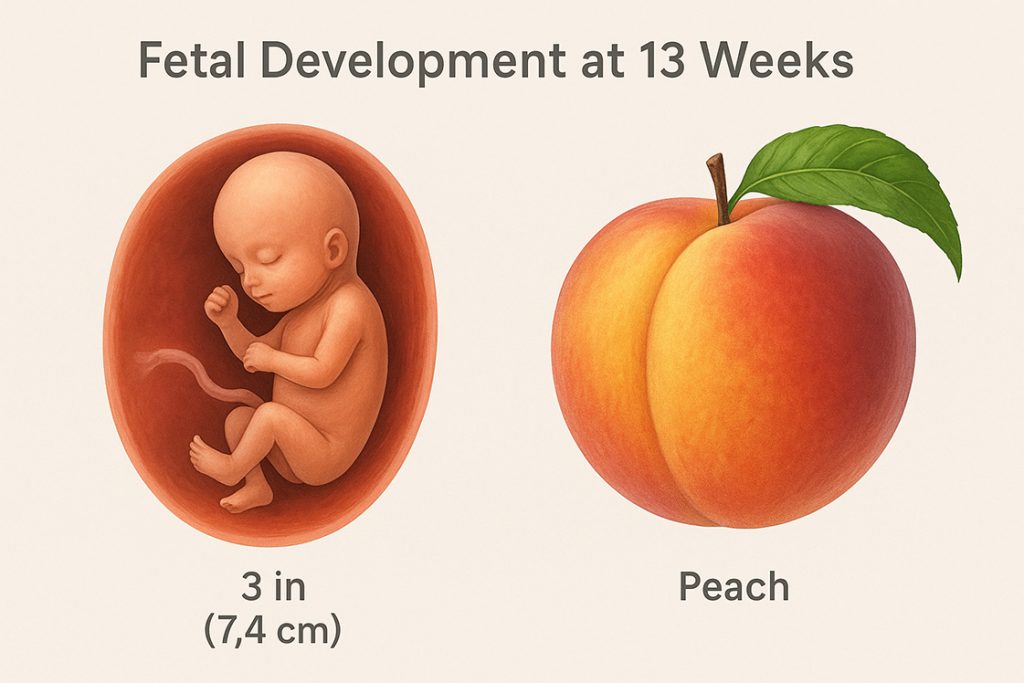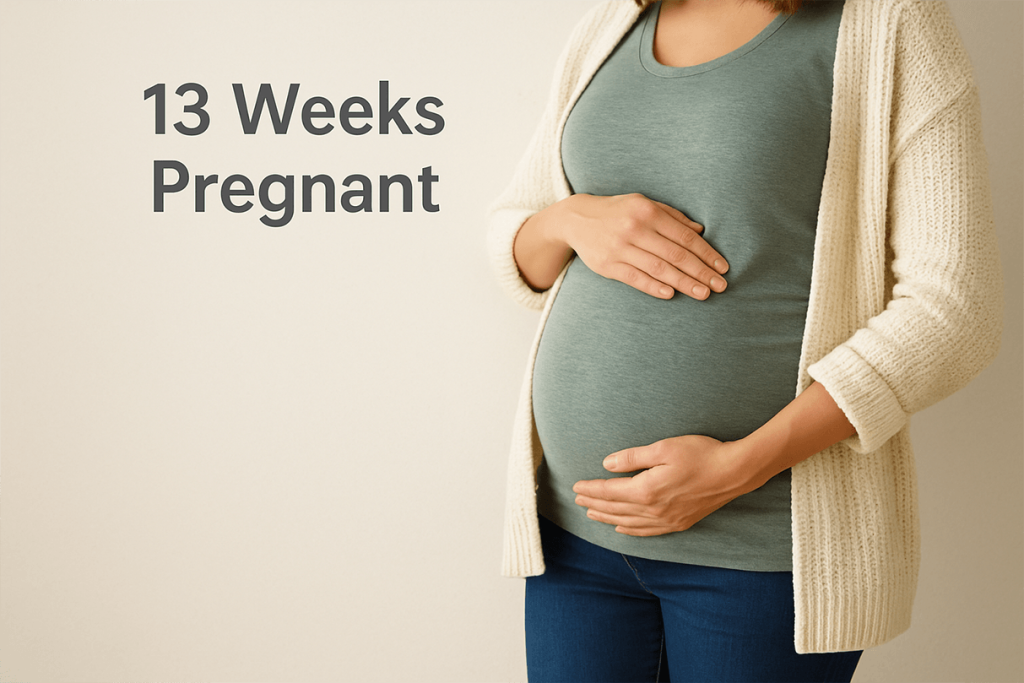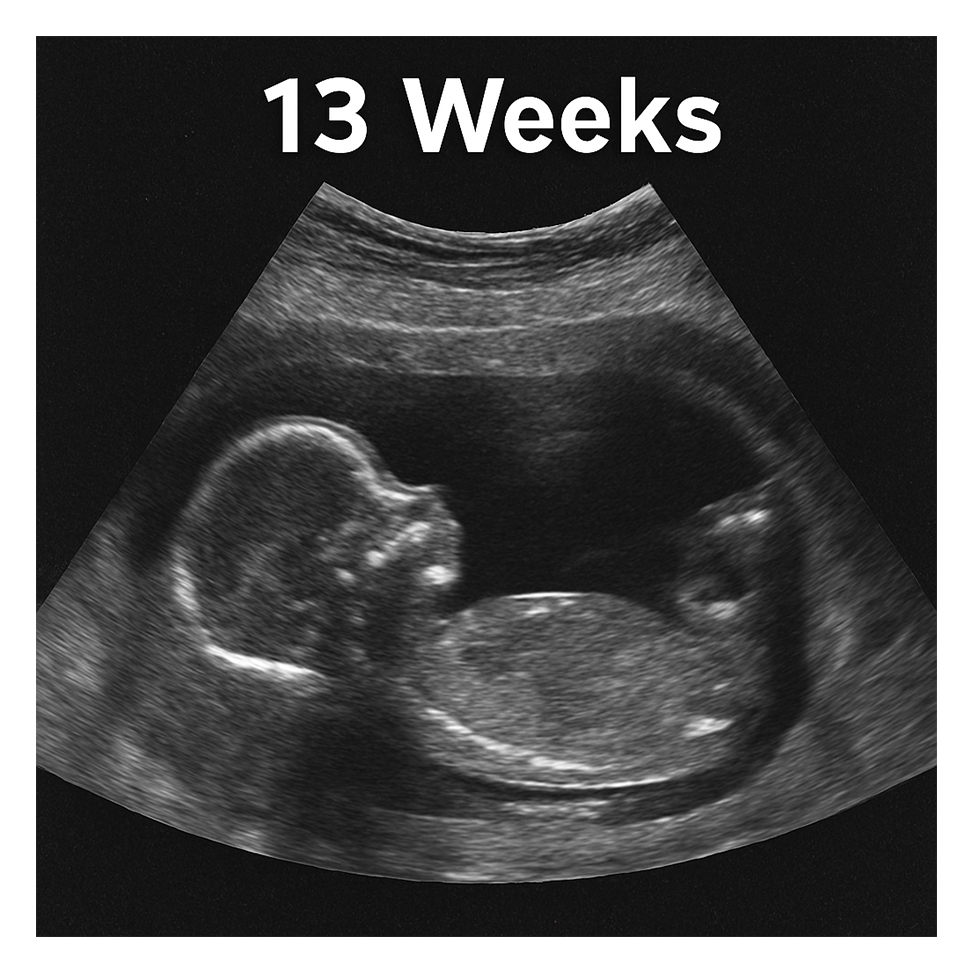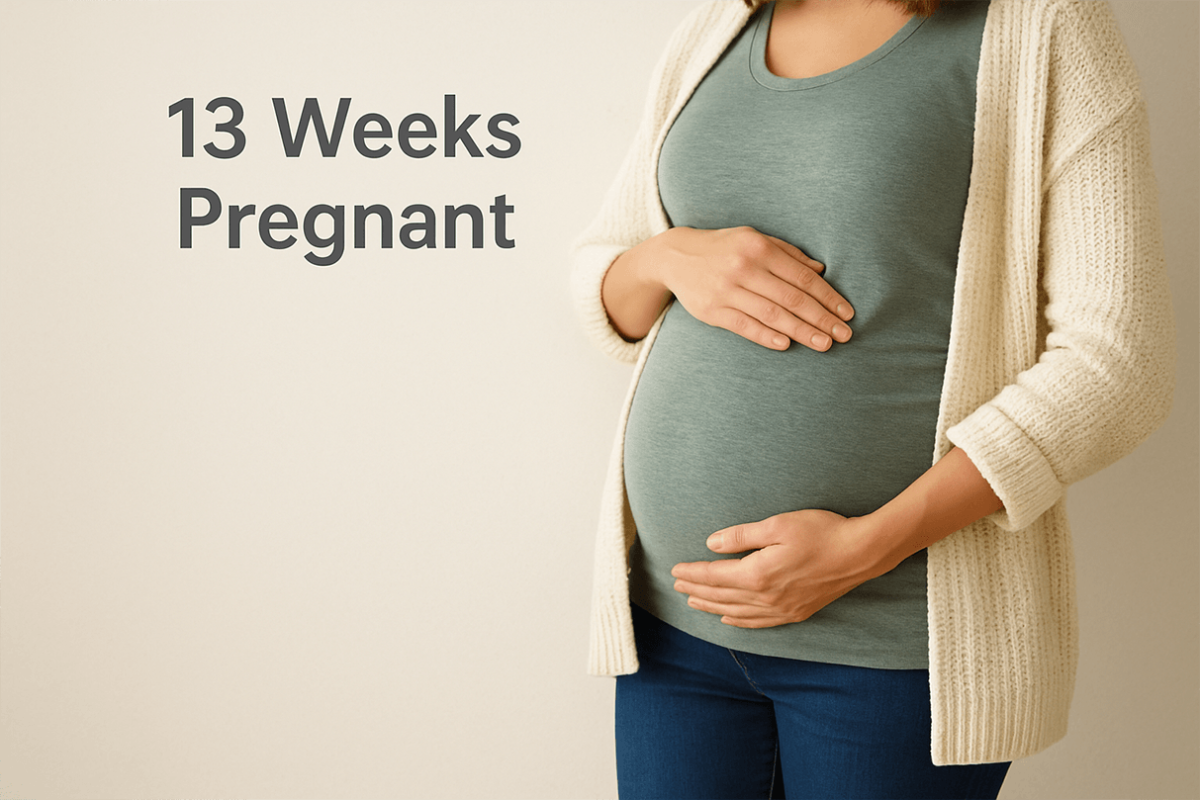🌟 Welcome to Week 13: A Major Pregnancy Milestone
You’ve made it! At 13 weeks pregnant, you’re officially stepping into the second trimester. This is a time when many expectant mothers start to feel better—nausea often eases, energy returns, and the risk of miscarriage significantly decreases [ACOG].
Let’s dive into what’s happening inside your body and how your baby is growing.
👶 Baby’s Development at 13 Weeks

At 13 weeks, your baby is about the size of a plum, measuring approximately 2.9 inches (7.4 cm) in length and weighing around 0.8 ounces (23 grams).
Key Baby Development Highlights:
- Vocal cords and teeth are forming.
- Intestines have moved from the umbilical cord into the abdomen.
- Arms and legs are lengthening, and your baby is flexing them!
- Lanugo, a soft, fine hair, starts covering the body to help regulate temperature.
- External genitals are developing and may be distinguishable on an ultrasound soon.
🤰 Your Body at 13 Weeks Pregnant
Many women report feeling like themselves again during this time. Hormones begin to stabilize, and that debilitating fatigue and morning sickness from the first trimester often ease up.
Changes You Might Notice:
- Baby bump begins to show: Your uterus is now out of the pelvis and expanding upward.
- Breasts remain tender but may feel less sore than before.
- Increased vaginal discharge is normal (called leukorrhea).
- Mild round ligament pain due to the stretching uterus.
- Skin changes like a “pregnancy glow” or the appearance of dark patches (melasma).
Note: While these changes are normal, speak to your healthcare provider if anything feels unusual.
🍽️ Nutrition and Tips for 13 Weeks Pregnant
As your appetite returns, it’s crucial to focus on a nutrient-rich diet. Your baby is rapidly growing, and the second trimester is essential for development.
Nutrition Tips:
- Iron-rich foods: leafy greens, lean meats, legumes
- Calcium and Vitamin D: for bone development
- Folate and B12: to prevent birth defects
- Hydration: Drink at least 8–10 glasses of water per day
For detailed recommendations, visit the World Health Organization – Nutrition Guidelines.
🛏️ Common Symptoms at 13 Weeks Pregnant
Here’s a list of what you may feel this week:
| Symptom | Description |
|---|---|
| ✅ Reduced nausea | Morning sickness may ease |
| ✅ Increased energy | Hormones balance out |
| ✅ Bloating and gas | Slowed digestion |
| ✅ Headaches | Caused by hormone shifts |
| ✅ Nasal congestion | Due to increased blood flow |
| ✅ Constipation | Progesterone relaxes the bowel |
| ✅ Breast changes | Nipples darken and may leak colostrum |
📸 13 Weeks Pregnant Belly: What to Expect

You may now start to see a noticeable baby bump, especially if this isn’t your first pregnancy. The uterus has grown to about the size of a grapefruit and is no longer tucked within the pelvis.
Some women show earlier, while others might still not appear very pregnant—both are completely normal.
If you haven’t already, consider taking your first bump photo to start your pregnancy journal or timeline. This can be a beautiful keepsake!
🩺 Prenatal Care and Screenings
Now is a great time to continue or schedule your first-trimester screening if not already done. This typically includes:
- Nuchal Translucency Ultrasound
- Blood tests for chromosomal abnormalities
- Urine test for protein, sugar, and infections
- Weight and blood pressure checks
Refer to NHS – Your Antenatal Care for what to expect in your visits.
🧘 Mental Health at 13 Weeks Pregnant
Your emotional well-being is just as important as your physical health. While the second trimester is often a “honeymoon phase,” don’t hesitate to:
- Practice prenatal yoga or meditation
- Seek support from family or counseling services
- Track your moods
The American College of Obstetricians and Gynecologists (ACOG) stresses the importance of mental health care throughout
13 Weeks Pregnant: Entering the Second Trimester, Belly, Symptoms, and More
Emotional Changes at 13 Weeks Pregnant
Alongside physical changes, emotional fluctuations are common. The initial anxiety from early pregnancy might begin to ease. Hormonal shifts can still cause mood swings, but many women report a renewed sense of energy and emotional balance around this time.
Hormones like progesterone and estrogen continue to rise, helping the uterus support the growing baby. According to the American College of Obstetricians and Gynecologists (ACOG), these hormonal changes are essential for fetal development, but they also influence your emotional state, potentially leading to moments of anxiety, joy, or irritability.
Tip: Support from your partner, loved ones, or a therapist can help you cope with any ongoing emotional challenges.
Common Tests and Screenings in Week 13
As part of routine prenatal care, your healthcare provider may recommend several important tests during this time:
- First-trimester screening (if not already done): A combination of a blood test and nuchal translucency ultrasound to assess the risk of chromosomal abnormalities like Down syndrome.
- Cell-free fetal DNA testing: A non-invasive prenatal test (NIPT) that analyzes fetal DNA in the mother’s blood to detect possible genetic conditions.
- Urine and blood tests: To check for gestational diabetes, anemia, and infections.
According to NHS guidelines, discussing these tests with your provider ensures informed decision-making tailored to your health profile.
13 Weeks Pregnant Ultrasound: What You Might See

During an ultrasound at 13 weeks:
- Your baby is fully formed with organs, limbs, and facial features.
- You might see them kicking, stretching, or even sucking their thumb.
- Fetal heartbeat is strong and typically between 110–160 beats per minute.
You may also receive a more accurate due date estimate based on measurements during the scan.
Internal link: For more on what to expect during ultrasound appointments, read our detailed post on 10 Weeks Pregnant: Baby Size, First Trimester Milestones & Tips.
Tips for a Healthy 13th Week of Pregnancy
Here are evidence-based suggestions for a healthier pregnancy this week:
1. Hydration and Nutrition
- Drink at least 8-10 cups of water daily.
- Focus on a balanced diet: whole grains, lean proteins, fruits, vegetables, and healthy fats.
- Take a prenatal vitamin with folic acid, iron, DHA, and calcium.
2. Safe Physical Activity
- According to the WHO, pregnant women should get at least 150 minutes of moderate-intensity aerobic activity per week.
- Consider prenatal yoga or walking to maintain energy and ease lower back pain.
3. Sleep and Rest
- Use a pregnancy pillow to support your growing bump.
- Sleep on your side to improve blood flow to the placenta.
4. Mental Health
- Journal your thoughts or join a prenatal support group.
- Speak to your healthcare provider if you’re experiencing persistent sadness, anxiety, or mood instability.
Your Baby Bump at 13 Weeks
For many women, the baby bump starts to become more noticeable now. Your uterus has grown beyond the pelvic bones and may cause the lower belly to protrude slightly. However, this varies based on your body type, whether it’s your first pregnancy, and your muscle tone.
Internal Link: Explore our post on 12 Weeks Pregnant: First Trimester Ends, Symptoms & Baby Bump for comparison.
FAQs About Being 13 Weeks Pregnant
It’s possible, but not always accurate. Gender can often be suggested through an ultrasound, but definitive results may require NIPT or waiting until the 20-week anatomy scan.
Yes. Although many women start feeling more energetic, it’s still normal to feel tired as your body continues to support pregnancy growth and changes.
Continue to avoid:
– Raw or undercooked meats and eggs
– Unpasteurized cheeses
– High-mercury fish (e.g., shark, swordfish)
– Excess caffeine (limit to 200mg per day)
See Mayo Clinic’s pregnancy nutrition guide for more detail.
For many, nausea begins to ease as you enter the second trimester, but for others, it can persist a bit longer. If vomiting becomes severe, consult your doctor for evaluation and treatment.
Preparing for the Second Trimester
As you wrap up your first trimester and step into the next phase of pregnancy, here’s what to look forward to:
- Stronger fetal movements in the coming weeks
- Increased appetite and improved energy
- More visible belly and perhaps maternity clothes
- Planning for birth and prenatal classes

Leave a Comment